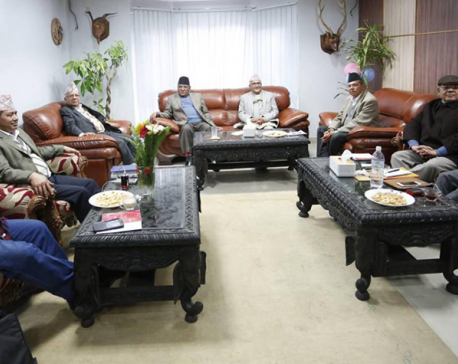
OR
Identity politics wanes as leaders cut ties to regional parties
Published On: November 9, 2017 09:54 AM NPT By: Bhim Chapagain
ILAM, Nov 9: Candidate of then CPN (Maoist) Bishwadip Lingden defeated CPN-UML leader K P Sharma Oli when the slogans of identity politics raised by the Maoists held sway all across the villages back during the first Constituent Assembly polls in 2008. Lingden's success in defeating Oli in Jhapa by a wide margin of over 5,000 votes drew national attention.
But Lingden's soaring popularity after the poll victory was short-lived. His popularity started fading after he decided to become part of the Federal Socialist Party along with then UML Vice-Chairman Ashok Rai. Lingden also started feeling frustrated after this party merged with the Madhesi People's Rights Forum (MPRF).
He recently became part of the Nepali Congress (NC), the party many criticized as being anti-identity when identity politics was at its height. “We formed the Federal Socialist Party to bring about liberation for all people including those who are marginalized in terms of geography, caste and religion. But now the Socialist Party is no longer a mainstream party. After its merger with the Forum, it has been reduced to a regional identity-based party,” he said.
Lingden accused Ashok Rai of making the Socialist Party a Madhes-centric party after its merger with MPRF. “When I listened to the speeches of Forum President Yadav, I realized that the Socialist Party can never extend its view from Taplejung to Dadeldhura,” he said. “I decided to join the multi-identity Nepali Congress after concluding that the Socialist Forum cannot resolve the issues of identity politics.”
After fighting for over 31 years for single-identity based politics in the eastern hill districts, former general secretary of the Federal Limbuwan Party Tek Bahadur Khujum also joined the NC recently. He argued that he decided to join NC after concluding that it was meaningless for regional parties to take up the agenda of identity politics.
“No matter how hard we shout in the east, Kathmandu will never listen. If we really want to make them listen, we must make Kathmandu our destination,” he said. "We can neither raise the agenda of identity politics nor reflect our identity in state structures if people believing in identity politics do not reach Kathmandu,” he further said.
Khajum said although he fought for federalism based on identity for over three decades, he now realizes that one must, in the end, reach the place where decisions are actually made to promote one's cause.
Dissatisfaction started brewing among the leaders of identity politics following the promulgation of the constitution in September 2015. While a section of the leaders felt that part of their demands was fulfilled as the constitution guaranteed secularism and a democratic, republican system, another section argued they needed further struggle to achieve their goals.
Khajum said they called for further struggle right after the constitution was promulgated. “We were unhappy with the emergence of another section of leaders opposing the constitution altogether unless it provided for fully identity-based federalism,” he further said.
There were over a dozen identity-based political parties active in the eastern hills after the success of the people's movement in 2006. The number is now down to less than half a dozen, and many of them splintered. While the mandate they received in the 2008 polls was less than expected, it was further reduced in the 2013 polls.
The identity-based parties declared unity three years ago. But within these three years, the Lingden-led Federal Limbuwan Party divided along three different party lines, particularly after Lingden decided to merge the party with the Federal Socialist and Madhesi-based parties without holding 'consultations'. Differences among the constituent parties of the Federal Limbuwan Party peaked after Lingden registered his own old party, Federal Limbuwan State Council, with the Election Commission even before the unified party could hold its first meeting. Following the move, Lingden was ousted from Federal Limbuwan Party and Sanjuhang Palungwa was made its president.
The Limbuwan party has, among other things, demanded the creation of a federal province comprising all the districts east of the Arun River. Although they are not happy with the province demarcations that includes 14 various districts in the eastern region, the identity-based political parties ironically lost their deposits in their own heartland in the recent local-level poll.
You May Like This

Left parties struggle to accommodate key leaders
KATHMANDU, FEB 18: Despite a supposed breakthrough over the issue of leadership and organization, UML and the CPN (Maoist Center)... Read More...

Infographics: Arab nations cut ties with Qatar
Arab nations cut ties with Qatar ... Read More...

Thapa calls on parties to quit 'dirty politics'
POKHARA, June 24: Deputy Prime Minister and Minister for Foreign Affairs, Federal Affairs and Local Development, Kamal Thapa has called... Read More...






Just In
- Challenges Confronting the New Coalition
- NRB introduces cautiously flexible measures to address ongoing slowdown in various economic sectors
- Forced Covid-19 cremations: is it too late for redemption?
- NRB to provide collateral-free loans to foreign employment seekers
- NEB to publish Grade 12 results next week
- Body handover begins; Relatives remain dissatisfied with insurance, compensation amount
- NC defers its plan to join Koshi govt
- NRB to review microfinance loan interest rate











Leave A Comment